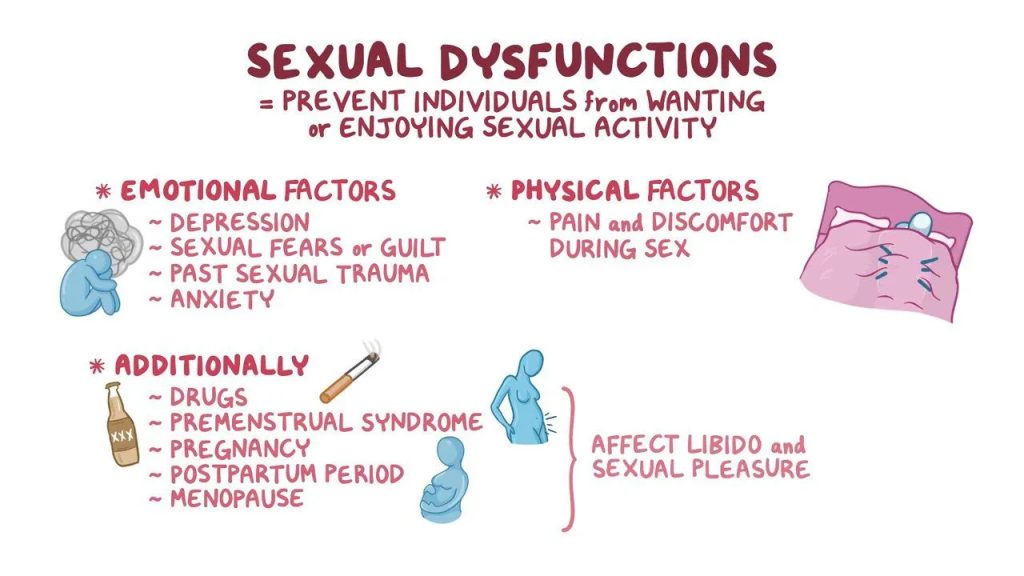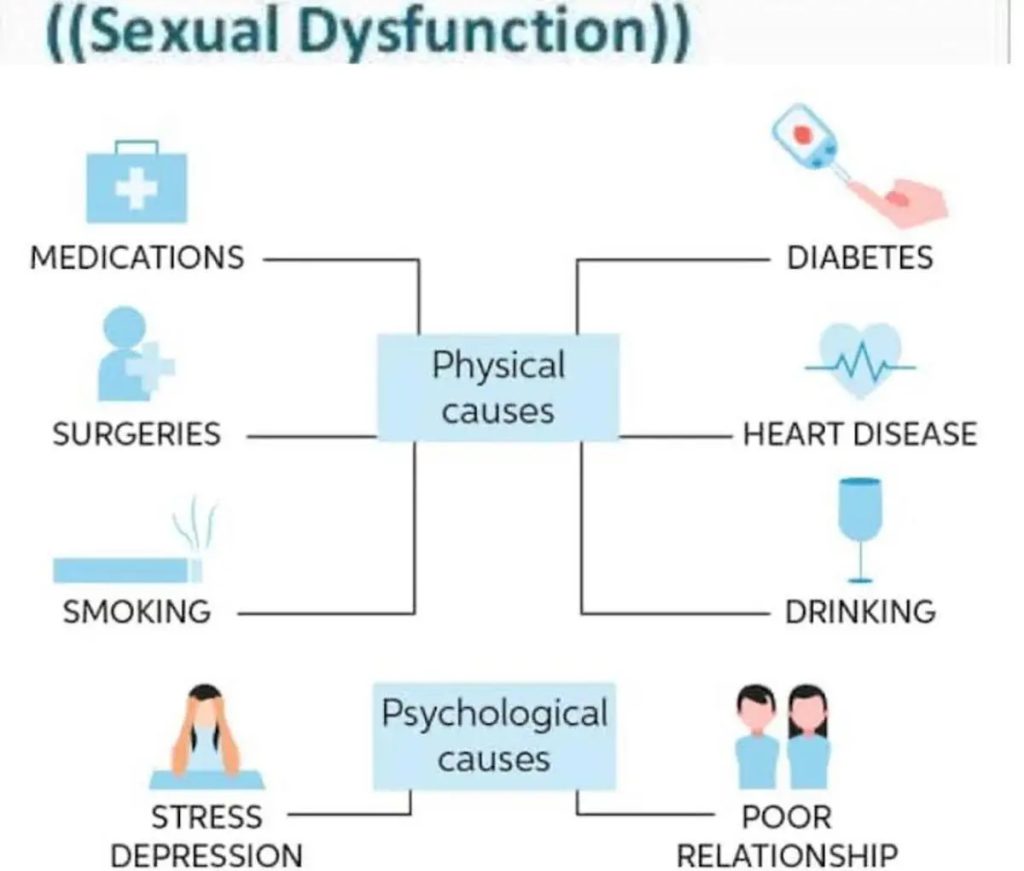Different types of Sexual Dysfunction in Men and Women.
The term sexual dysfunction refers to any problem that hinders one or both partners from achieving sexual satisfaction during any of the phases of sexual response. In addition to excitement, plateau, orgasm, and resolution, there are other phases to the sexual cycle.

An individual with sexual dysfunction has a problem that prevents them from wanting or enjoying sexual activity. However, there is a difference between sexual function and asexuality. The chances of experiencing sexual dysfunction increase with age, but it happens to people of all ages.
There are several types of sexual dysfunction, affecting up to 43 percent of women and 31 percent of men to varying degrees. The most common type of male sexual dysfunction is erectile dysfunction, followed by orgasm/ejaculation disorders and priapism. Whereas, loss of interest in sex, difficulty reaching orgasm, negative thoughts during sex, and vaginal dryness and tightness causing painful intercourse, are the different types of sexual dysfunction experienced by women.
Causes of Sexual dysfunction
There could be a number of reason due to which an individual man or woman experience sexual dysfunction. Such causes are categorized into two groups namely Physical cause and Psychological cause.

Physical cause
There are many physical causes associated with physical sexual dysfunction. The following disease and condition can result in sexual dysfunction.
- Urological infections or cancer
- Neurological disorders
- Chronic diseases, such as kidney failure
- Nerve damage
- Diabetes
- heart disease and blood vessel disease
- High blood pressure
- Alcoholism
- Drug abuse
- High cholesterol
- Hormonal imbalances
A number of medications, such as blood pressure medications and antidepressants, as well as alcohol and recreational drugs, can interfere with normal sexual function. Additionally, some medical treatments can have an impact on sexual function. A surgical procedure can, for example, cause nerve damage that affects sexual function.
Psychological Cause
There are many people who suffer from psychologically induced sexual dysfunction. The effects of past sexual trauma can affect the sexual health of an individual that includes:
- guilt about sexual desire and activity
- relationship problems
- rape
- molestation, and a negative sexual experience
- concerns about sexual performance
- depression
- self-esteem and self-image issues.
- stress
- anxiety
- self-esteem or body image issues
These all could contribute in causing negative impact on an individual’s sexual life and health causing dysfunction.
Types of Sexual dysfunction
There are generally four categories to identify the kind of sexual dysfunction experienced by an individual.
1. Sexual desire disorder
Sexual desire disorders or low libido disorders affect sexual desire and interest in sex. There are many factors that can lead to decreased libido, including hormonal fluctuations and medical conditions (like diabetes and heart disease). There are also relationship issues, sexual inhibitions, fatigue, fear, depression, and anxiety, which are all factors that can contribute to decreased libido.
A number of factors contribute to anxiety and depression, including increasing age, pregnancy, depression, anxiety, and using certain medications, such as selective serotonin reuptake inhibitors. Aside from relationship conflicts, physical illnesses such as diabetes and hypertension also contribute to depression.
2. Sexual arousal disorder
This category includes individual who avoid sexual contact with their partners due to an aversion or tendency. It is possible for males to only maintain a partial erection or to be unable to attain an erection at all. Affected males may also find that sexual activity does not excite or provide them with any pleasure. Females affected by the condition may not be able to obtain lubrication prior to intercourse.
3. Orgasm disorder
These problems occur most often in women, but can also affect men. They involve lack of or delayed orgasm. An absence or delayed orgasm can be caused by pain during sexual activity, stress, fatigue, hormonal changes, and a reduced libido. Ejaculation disorder is one that is included in male orgasm disorder. It is further classified as:
- Premature ejaculation
- Inhibited or delayed ejaculation
- Retrograde ejaculation
4. Sexual Pain Disorders
Men and women can both suffer from these types of pain during intercourse. Pain may occur in women due to vaginal dryness, vaginismus (a condition that affects the vaginal muscles), urinary tract infections (UTIs), hormonal changes during menopause, and other reasons. There are several causes of pain in men, including Peyronie’s disease (damage to the penis), infections like UTIs, prostatitis and yeast infections, genital herpes, and skin conditions.
There is also a condition called vaginismus, which causes the muscles of the vaginal wall to spasm involuntarily during sexual contact. Previous sexual trauma such as abuse or assault may trigger these spasms, but their cause is unknown.
There could be other reasons for an individual that deals with pain during sexual activity. It is advisable to discuss all the details with your health professional advisor so that appropriate means and ways could be figured out.
REFERENCES:
- https://www.healthline.com/health/what-sexual-dysfunction
- https://www.beaumont.org/conditions/male-female-sexual-dysfunction-types
- https://my.clevelandclinic.org/health/diseases/9122-sexual-dysfunction-in-males
- https://www.ncbi.nlm.nih.gov/pmc/articles/PMC5310110/
- https://www.mayoclinic.org/diseases-conditions/female-sexual-dysfunction/symptoms-causes/syc-20372549
- https://www.nhs.uk/conditions/erection-problems-erectile-dysfunction/
For more details, kindly visit below.